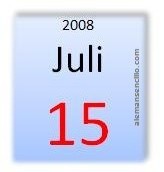The Date in German
In this article we tell you how to form and say the date in German

Date format
In German, dates are written with the formats:
Long format:
der 01.Februar 2009
the 1st of February, 2009
Short format:
der 01.02.2009
01 (day)/02 (month)/2009
Differences between English and German date formats:
- The separating symbol between the month, year and day in English is the slash “/” and in German it is the period “.”
- The months in German are written with a capital letter (Februar) like in English
Reading the date
In German the days and months are ordinal numbers but the years are cardinal.
You have to keep in mind that ordinal numbers are declined like adjectives:
example 1:
der 01.02.2009
it is read as:
der erste zweite zweitausendneun (in the nominative)
example 2:
am 01.02.2009
it is read as:
am ersten zweiten zweitausend neun (in the dative)
Reading the year
The way to read the year is different if the year is before 2000 or after:
- If it is after the year 2000, it is read as a normal number:
2004 is read as zweitausendvier
- If the year is before 2000, it is read in an interesting way. We can see this better with an example:
The year 1995 is read as neunzehnhundertfünfundneunzig
translated literally, it would be 19 hundred 5 and 90
The year 1900 is read simply as neunzehnhundert
Asking what the date is
This is how you as the date in German:
Welcher Tag ist heute? ... Es ist der erste Mai
What day is today? …Today is the 1st of May
or also:
Welchen Tag haben wir heute? ... Heute haben wir den ersten Mai
What day do we have? …. Today we have the 1st of May
Pay close attention to the first example. The date is in the nominative and in the second one it is in the accusative.
Units of time (Zeiteinheiten)
| Einheiten | Units |
|---|---|
| die Sekunde | second |
| die Minute | minute |
| die Stunde | hour |
| der Tag | day |
| die Woche | week |
| der Monat | month |
| die Jahreszeit | season |
| das Quartal das Vierteljahr | quarter |
| das Halbjahr das Semester | semester |
| das Jahr | year |
| das Jahrzehnt | decade |
| das Jahrhundert | century |
| das Jahrtausend | millennium |
Seasons of the year (die Jahreszeiten)
| Jahreszeiten | Seasons |
|---|---|
| der Frühling | spring |
| der Sommer | summer |
| der Herbst | autumn |
| der Winter | winter |
Months (Monate)
| Monate | Months |
|---|---|
| der Januar | January |
| der Februar | February |
| der März | March |
| der April | April |
| der Mai | May |
| der Juni | June |
| der Juli | July |
| der August | August |
| der September | September |
| der Oktober | October |
| der November | November |
| der Dezember | December |
Days of the week (Wochentage)
| Wochentage | Days of the week |
|---|---|
| der Montag | Monday |
| der Dienstag | Tuesday |
| der Mittwoch | Wednesday |
| der Donnerstag | Thursday |
| der Freitag | Friday |
| der Samstag der Sonnabend | Saturday |
| der Sonntag | Sunday |
Parts of the day
| Parts of the day | |
|---|---|
| das Morgengrauen | dawn (12 am - 6 am) |
| der Morgen | morning (6 am - 10 am) |
| der Vormittag | late morning (10 am - 12 pm) |
| der Mittag | noon (12 pm - 2 pm) |
| der Nachmittag | afternoon (2 pm - 4 pm) |
| der Abend | evening (4 pm - 7pm) |
| die Nacht | night (7pm - 12 am) |
Before and After Christ (Death)
vor Christus abbreviated: v. Chr. or v. C.
before Christ abbreviated: b.c.
nach Christus abbreviated: n. Chr. or n. C.
after Christ (death) abbreviated: a. c.
Related topics: Time in German, numbers in German
Next Lessons:
home > : German alphabet | Eszett | Time | Happy Birhday | Saying thank you | Apostrophe | Informal you in German | German National Anthem | How to write a letter in German | German Jokes | Carols
Suggestions to Help You | Difficulties with learning German | Greetings